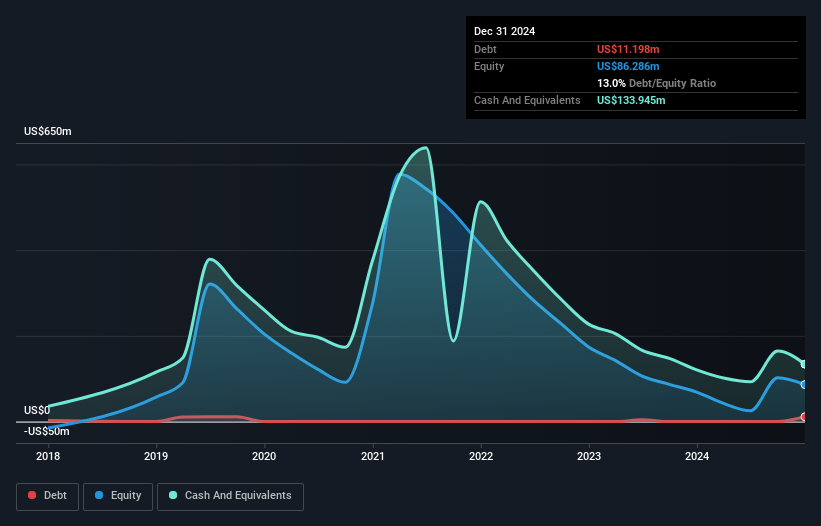Health Check: How Prudently Does Jumia Technologies (NYSE:JMIA) Use Debt?

Legendary fund manager Li Lu (who Charlie Munger backed) once said, 'The biggest investment risk is not the volatility of prices, but whether you will suffer a permanent loss of capital.' It's only natural to consider a company's balance sheet when you examine how risky it is, since debt is often involved when a business collapses. As with many other companies Jumia Technologies AG (NYSE:JMIA) makes use of debt. But the more important question is: how much risk is that debt creating?
What Risk Does Debt Bring?
Debt is a tool to help businesses grow, but if a business is incapable of paying off its lenders, then it exists at their mercy. If things get really bad, the lenders can take control of the business. However, a more common (but still painful) scenario is that it has to raise new equity capital at a low price, thus permanently diluting shareholders. Of course, debt can be an important tool in businesses, particularly capital heavy businesses. When we think about a company's use of debt, we first look at cash and debt together.
View our latest analysis for Jumia Technologies
What Is Jumia Technologies's Net Debt?
As you can see below, at the end of December 2024, Jumia Technologies had US$11.2m of debt, up from none a year ago. Click the image for more detail. However, its balance sheet shows it holds US$133.9m in cash, so it actually has US$122.7m net cash.

A Look At Jumia Technologies' Liabilities
Zooming in on the latest balance sheet data, we can see that Jumia Technologies had liabilities of US$95.7m due within 12 months and liabilities of US$10.1m due beyond that. Offsetting this, it had US$133.9m in cash and US$23.1m in receivables that were due within 12 months. So it can boast US$51.2m more liquid assets than total liabilities.
This surplus suggests that Jumia Technologies has a conservative balance sheet, and could probably eliminate its debt without much difficulty. Simply put, the fact that Jumia Technologies has more cash than debt is arguably a good indication that it can manage its debt safely. There's no doubt that we learn most about debt from the balance sheet. But ultimately the future profitability of the business will decide if Jumia Technologies can strengthen its balance sheet over time. So if you want to see what the professionals think, you might find this free report on analyst profit forecasts to be interesting.
In the last year Jumia Technologies had a loss before interest and tax, and actually shrunk its revenue by 10%, to US$167m. That's not what we would hope to see.
So How Risky Is Jumia Technologies?
We have no doubt that loss making companies are, in general, riskier than profitable ones. And in the last year Jumia Technologies had an earnings before interest and tax (EBIT) loss, truth be told. Indeed, in that time it burnt through US$61m of cash and made a loss of US$99m. However, it has net cash of US$122.7m, so it has a bit of time before it will need more capital. Even though its balance sheet seems sufficiently liquid, debt always makes us a little nervous if a company doesn't produce free cash flow regularly. The balance sheet is clearly the area to focus on when you are analysing debt. But ultimately, every company can contain risks that exist outside of the balance sheet. For instance, we've identified 3 warning signs for Jumia Technologies that you should be aware of.
If you're interested in investing in businesses that can grow profits without the burden of debt, then check out this free list of growing businesses that have net cash on the balance sheet.
New: Manage All Your Stock Portfolios in One Place
We've created the ultimate portfolio companion for stock investors, and it's free.
• Connect an unlimited number of Portfolios and see your total in one currency
• Be alerted to new Warning Signs or Risks via email or mobile
• Track the Fair Value of your stocks
Have feedback on this article? Concerned about the content? Get in touch with us directly. Alternatively, email editorial-team (at) simplywallst.com.
This article by Simply Wall St is general in nature. We provide commentary based on historical data and analyst forecasts only using an unbiased methodology and our articles are not intended to be financial advice. It does not constitute a recommendation to buy or sell any stock, and does not take account of your objectives, or your financial situation. We aim to bring you long-term focused analysis driven by fundamental data. Note that our analysis may not factor in the latest price-sensitive company announcements or qualitative material. Simply Wall St has no position in any stocks mentioned.
About NYSE:JMIA
Jumia Technologies
Operates an e-commerce platform in West Africa, North Africa, East Africa, Europe, the United Arab Emirates, and internationally.
Excellent balance sheet low.
Similar Companies
Market Insights
Community Narratives




